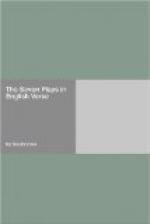CH. Ah, Seer! how surely didst thou aim thy word!
MESS. So stands the matter. Make of it what ye list.
CH. See, from the palace cometh close to us
Creon’s unhappy wife, Eurydice.
Is it by chance, or heard she of her son?
Enter EURYDICE.
EURYDICE. Ye men of Thebes, the tidings met mine
ear
As I was coming forth to visit Pallas
With prayerful salutation. I was loosening
The bar of the closed gate, when the sharp sound
Of mine own sorrow smote against my heart,
And I fell back astonied on my maids
And fainted. But the tale? tell me once more;
I am no novice in adversity.
MESS. Dear lady, I will tell thee what I saw,
And hide no grain of truth: why should I soothe
Thy spirit with soft tales, when the harsh fact
Must prove me a liar? Truth is always best.
I duly led the footsteps of thy lord
To the highest point of the plain, where still was
lying,
Forlorn and mangled by the dogs, the corse
Of Polynices. We besought Persephone
And Pluto gently to restrain their wrath,
And wash’d him pure and clean, and then we burned
The poor remains with brushwood freshly pulled,
And heaped a lofty mound of his own earth
Above him. Then we turned us to the vault,
The maiden’s stony bride-chamber of death.
And from afar, round the unhallowed cell,
One heard a voice of wailing loud and long,
And went and told his lord: who coming near
Was haunted by the dim and bitter cry,
And suddenly exclaiming on his fate
Said lamentably, ’My prophetic heart
Divined aright. I am going, of all ways
That e’er I went, the unhappiest to-day.
My son’s voice smites me. Go, my men, approach
With speed, and, where the stones are torn away,
Press through the passage to that door of death,
Look hard, and tell me, if I hear aright
The voice of Haemon, or the gods deceive me.’
Thus urged by our despairing lord, we made
Th’ espial. And in the farthest nook of
the vault
We saw the maiden hanging by the neck
With noose of finest tissue firmly tied,
And clinging to her on his knees the boy,
Lamenting o’er his ruined nuptial-rite,
Consummated in death, his father’s crime
And his lost love. And when the father saw him,
With loud and dreadful clamour bursting in
He went to him and called him piteously:
’What deed is this, unhappy youth? What
thought
O’ermaster’d thee? Where did the
force of woe
O’erturn thy reason? O come forth, my son,
I beg thee!’ But with savage eyes the youth
Glared scowling at him, and without a word
Plucked forth his two-edged blade. The father
then
Fled and escaped: but the unhappy boy,
Wroth with himself, even where he stood, leant heavily
Upon his sword and plunged it in his side.—
And while the sense remained, his slackening arm
Enfolded still the maiden, and his breath,
Gaspingly drawn and panted forth with pain,
Cast ruddy drops upon her pallid face;
Then lay in death upon the dead, at last
Joined to his bride in Hades’ dismal hall:—
A monument unto mankind, that rashness
Is the worst evil of this mortal state.
[Exit EURYDICE




